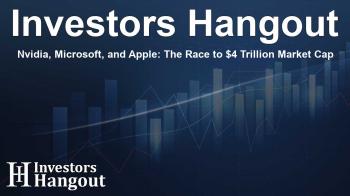Nvidia, Microsoft, and Apple: The Race to $4 Trillion Market Cap

The Race for $4 Trillion: A New Era in Market Capitalization
In the world of technology stocks, a fierce rivalry is brewing between three industry giants: Apple Inc (AAPL), NVIDIA Corporation (NVDA), and Microsoft Corporation (MSFT). Each of these companies has made significant strides in market capitalization, and they now stand on the brink of a historic achievement—crossing the $4 trillion mark. Recent polls indicate that many investors are keenly interested in which of these powerhouses will be the first to achieve this monumental milestone.
The Leaders in Market Valuation
As of the latest assessments, NVIDIA is currently valued at approximately $3.852 trillion, making it the frontrunner in this race. Microsoft follows closely with a market cap of $3.697 trillion, while Apple holds a respectable position at $3.064 trillion. All three companies have demonstrated formidable growth over recent years, positioning them well in the eyes of investors.
NVIDIA: A Titan of Technology
NVIDIA has captured recent headlines not only for its impressive market valuation but also for its innovations in artificial intelligence and gaming technologies. Companies across various sectors are increasingly relying on NVIDIA's advanced chips and products, enhancing its status as a leader in the semiconductor industry. In just a few short years, it has become a household name in tech, often being deemed the most valuable public company in the world.
Microsoft's Consistent Performance
Meanwhile, Microsoft has seen steady growth in its market cap, contributing to its reputation as a stable investment. Known for its wide range of products and services, including cloud computing through Azure, Microsoft has effectively leveraged its technological advancements to foster consistent returns for its investors. In fact, Microsoft has shown year-to-date returns of +18.8%. This consistent performance makes it a strong competitor as it seeks to claim the coveted $4 trillion title.
Understanding Market Cap Movements
Market capitalization is a crucial metric that reflects the total value of a company's outstanding shares. It's not just about sheer numbers; the implications behind these valuations are profound. Investors and analysts closely monitor these movements to gauge a company's stability and potential for growth. As all eyes remain on these three tech titans, the competition intensifies, especially in the face of fluctuating market conditions.
Social Media Sentiment
A recent polling exercise conducted on social media reveals intriguing insights into investor sentiment. A staggering 79% of respondents identified NVIDIA as their pick for the company that will reach the $4 trillion mark first. Microsoft garnered about 14% of the votes, while Apple lagged behind at just 7%. Similar sentiments were echoed in subsequent polls across different social media platforms.
Comparing Performance Metrics
The performance metrics for these leading companies paint a compelling picture of their respective trajectories:
- NVIDIA: Year-to-Date +14.2%, One-Year +27.1%, Five-Year +1,544.0%
- Microsoft: Year-to-Date +18.8%, One-Year +8.9%, Five-Year +141.2%
- Apple: Year-to-Date -15.9%, One-Year -5.3%, Five-Year +125.4%
Investor Considerations
With the tech sector being a key driver in the global economy, understanding the trajectory of these three companies will be essential for investors. As more companies pivot towards AI and advanced technologies, NVIDIA's chips remain paramount. Simultaneously, the reliability and growth potential that Microsoft presents cannot be overlooked. Lastly, while Apple has seen some fluctuations, its established brand continues to draw consumer loyalty.
Frequently Asked Questions
What factors influence a company's market cap?
Market capitalization is affected by stock price fluctuations, the number of outstanding shares, and investor sentiment. Performance metrics, industry trends, and economic conditions can also play a significant role.
Why is $4 trillion a significant milestone?
Reaching a $4 trillion market cap would signify a tremendous achievement in financial markets, illustrating a company’s growth and the confidence investors have in its future performance.
How can investors decide which stock to choose?
Investors should evaluate financial performance, growth potential, market conditions, and individual company fundamentals. Researching industry trends and keeping abreast of news can also help guide decisions.
What are some risks associated with investing in tech stocks?
Investing in tech stocks can be volatile due to rapid innovation cycles and market fluctuations. Regulatory risks, competition, and economic downturns may also impact valuations.
How often should investors review their portfolios?
It's advisable for investors to review their portfolio regularly to assess performance, realign investment goals, and ensure diversification. The review frequency may vary based on individual strategies and market conditions.
About The Author
Contact Kelly Martin privately here. Or send an email with ATTN: Kelly Martin as the subject to contact@investorshangout.com.
About Investors Hangout
Investors Hangout is a leading online stock forum for financial discussion and learning, offering a wide range of free tools and resources. It draws in traders of all levels, who exchange market knowledge, investigate trading tactics, and keep an eye on industry developments in real time. Featuring financial articles, stock message boards, quotes, charts, company profiles, and live news updates. Through cooperative learning and a wealth of informational resources, it helps users from novices creating their first portfolios to experts honing their techniques. Join Investors Hangout today: https://investorshangout.com/
The content of this article is based on factual, publicly available information and does not represent legal, financial, or investment advice. Investors Hangout does not offer financial advice, and the author is not a licensed financial advisor. Consult a qualified advisor before making any financial or investment decisions based on this article. This article should not be considered advice to purchase, sell, or hold any securities or other investments. If any of the material provided here is inaccurate, please contact us for corrections.

